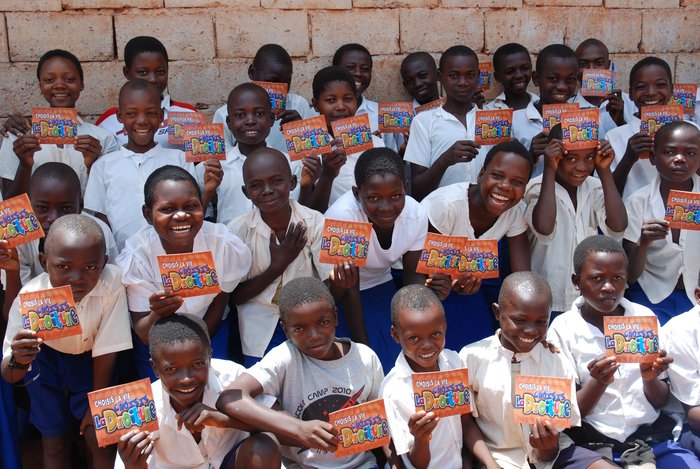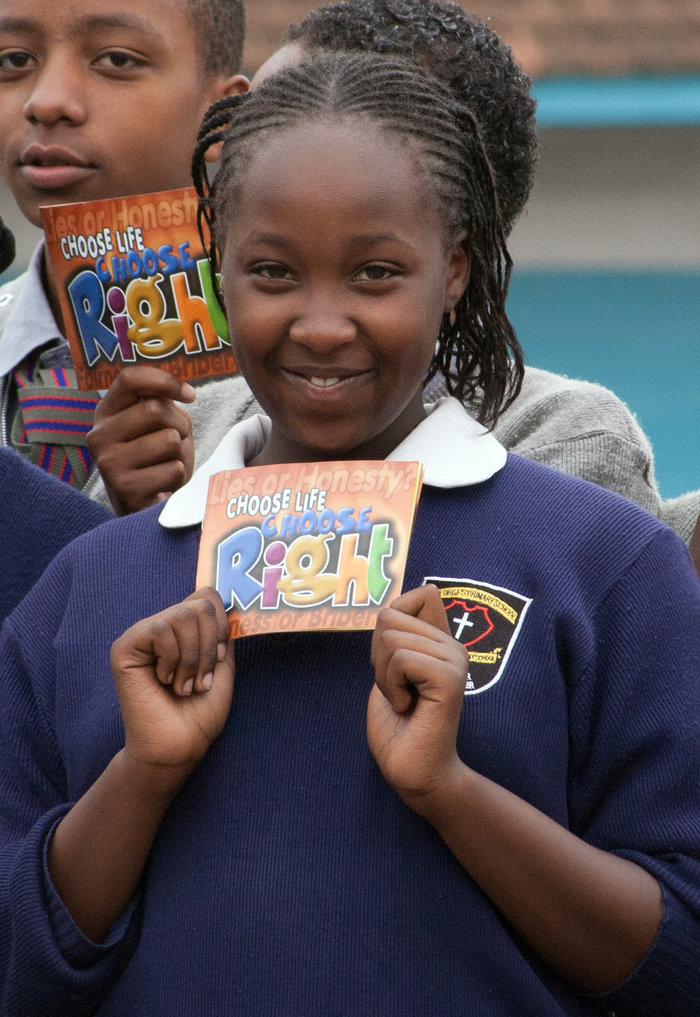In Kenya, where many children find themselves orphaned as a result of HIV/Aids, one special project is helping them choose to hold on to life.
“God is great. I am alive today because of Choose Life. I learnt that I can choose life or death. God gave me a chance to choose – I chose life.” Nancy*
Nancy lives in Nairobi, Kenya, she is 16 years old and is HIV positive. The virus can cast a long shadow: alongside the physical symptoms comes low self-esteem, self-condemnation and, in Nancy’s case, a reluctance to take her antiretroviral medication in the hope that she would die sooner. But the light of God’s love and hope expressed through the Choose Life Bible programme has offered Nancy and others like her the chance to live life to the full.
HIV in Kenya
Since the first case of HIV was diagnosed in Kenya in 1984, the epidemic has evolved to become one of the major causes of mortality in the country, placing huge demands on the health system and the economy. HIV/Aids affects all sections of society: children, youth, adults, women and men; and is responsible for an estimated 29% of annual adult deaths and 15% of deaths of children under five. At the end of 2013 around 1.6 million Kenyans (3.6% of the total population) were living with HIV. Kenya has an estimated 88,620 new HIV infections among adults and about 12,940 new infections among children annually.**
Many young people face the daily challenges of living with HIV: losing their parents to Aids, being abandoned by their families, dealing with the stigma of the disease. But an orphanage and its dedicated team of carers is giving hope and a reason to live to these young people.
A place of hope
Nyumbani (Swahili for “home”) was one of the very first orphanages set up to care for children living with HIV/Aids. Started in 1992 in the southern part of Nairobi, Nyumbani aims to provide comprehensive care and support for children, their families and communities. As the scale of the pandemic has steadily worsened, what began as a small home housing just three children has grown into a centre caring for over one hundred, ranging in age from newborn to 23 years old.
The home takes in children from all over Kenya, and some from neighbouring countries too. Younger children are cared for in “families” of 14, with children from 6 months to 11 years old. Male and female carers act as “fathers”/”uncles” and “mothers” in cottages that represent a “normal” family and home environment. When they reach their early teens the children move on to single-sex youth accommodation within the Nyumbani compound. Here they learn how to look after themselves, cooking and doing household chores. The very young children attend a preschool at Nyumbani while the older children go to local schools.
The adult carers are carefully recruited to assume a parent role in the lives of the children and to act as mentors, seeking to develop self-esteem and dignity, as well as supervising them to take their medication, and caring for them if and when they fall ill. The children at Nyumbani are orphans, having lost their parents to HIV/Aids and many having then been abandoned by the rest of their families because of their status. The carers offer support as the young people deal with all that has happened to them and work with their families to re-establish relationships.
Somebody, somewhere
Jane Magondu is one of the “mothers” at Nyumbani with specific responsibility for the older girls. She talks about the life-giving work they do: “What we do here is to give them hope and to show them they have somebody, somewhere, because they are the children who don’t have parents. We care for them from when they are babies. Some come when they are in a very bad situation, they are very sick, they cannot even move. But by God’s grace they are growing well and have a positive life.”
Part of the support and education Jane and others at Nyumbani provide is through Choose Life. The SGM Lifewords’ programme is used to help the carers address some of the issues facing the children they work with. Originally designed for classroom use – and with the HIV pandemic in mind – this curriculum-based series of resources looks at biblical values and how they are reflected in everyday life. One particular concern at Nyumbani is helping the younger children uphold the values of Choose Others, showing care for each other and living in peace together. Another key issue is helping the older children deal with their status and their place in society.
Jane uses Choose Life with the older girls at Nyumbani. They work through the material in an informal, peer-to-peer setting where the girls can chat and socialise while discussing the issues and challenges that are addressed through the material. “They have a lot of faith and hope [as a result of Choose Life],” says Jane. “They no longer see death; they see progress and long life. They even aspire to become significant people in the future.”
A life worth living
The Choose Life themes have also helped create a positive culture at the home: “It’s common practice for the boys and girls to remind one another to choose life, choose peace, choose right as they go about their day-by-day business,” says Jane. “Even the community around us, including their schools, envy our children – they have become so orderly and humble.”
But it’s not just a change in day-to-day attitudes – these teenagers are looking to their futures. One head-teacher told Jane that no one would be able to tell that the Nyumbani children have a life-threatening disease after hearing about how one of the girls declared to her class that she believed she would become a doctor and have a family in the future. Referring to some of the young women attached to the school, he said, “My girls now live ordinary happy lives. I am not surprised they are dreaming and making ambitious declarations – all I can say is their dreams are valid. They will live long to achieve them!”
The consequence of these positive choices reverberates not just at the home and at school but also in the local churches where the young people help set up, and participate in the services. One churchgoer said, “They exude restored self-worth and self-confidence.” Another said, “I can see the healing demonstrated by their restored dignity, open interactions and glowing faces.”
A bright future
But the real testimonies to the power of God’s Word are heard from the children themselves. Young people who once had very little to live for and whose futures were bleak. Choose Life has given them hope and a sense of responsibility for their lives and those of the people around them. Choose Life helped Nancy change her perspective and hold on to life: “I learnt that I have to love myself as I love others,” she says. “I now take the medication faithfully, I’m healthy and stronger.”
Another girl, Grace*, shared that she has chosen to let boys know that her focus is in her studies not sexual relationships. She knows every choice she makes has consequences: “I want to be like Joseph,” she says. “He refused and ran away from Potiphar’s wife.” She says there is high peer pressure at her school as many girls and boys are sexually active. She opts to read that passage (from one of the Choose Life booklets) again and again to remain strong.
Tom*, a young teenager, says he is careful about his love life because he wouldn’t want to infect someone by not disclosing his status. “I have a girlfriend,” he says, “but ours is not a sexual relationship because I fear the Lord and Choose Love has taught me that cool love waits.”
The onward journey
Choose Life is part of the legacy that Nyumbani offers its children. It is empowering more and more young people as they transition in life and journey through the different phases of their daily experiences, including sickness and recovery. Through the dedication of both staff and residents, Nyumbani hasn’t lost a single child to HIV in the past seven years. The partnership of the caregivers and Choose Life, and the tenacity of the children, has sown the seeds of possibility at Nyumbani and set the foundation for changed lives.

